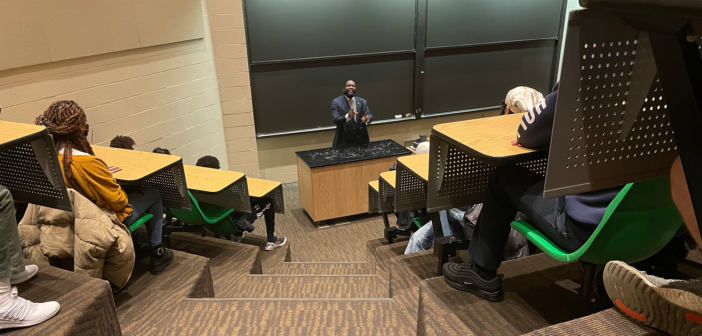Dr. Umar Johnson, a popular speaker and social media figure, spoke at Lehigh on Nov. 2 for an event titled “Let’s Talk About Critical Race Theory.”
The event, attended by roughly 130 people, was sponsored by the African Students Association, the Black Student Union, the Office of Student Affairs and the Lehigh National Society of Black Engineers.
Hajer Sabil, ‘23, president of the African Students Association, said the club was interested in bringing a different perspective to the Lehigh campus.
“We thought, ‘Let’s educate people because they might not understand critical race theory,’” Sabil said. “Then, we tried to find somebody who would be able to teach the topic, who was qualified to teach the topic and someone who would be appealing and get people to come out and listen.”
Johnson’s Instagram bio identifies him as a “Certified School Psychologist, Doctor of Clinical Psychology, Author, Pan-Afrikanist, Educator, FDMG Principal, Special Education Consultant, NIBPA.”
He has over 789,000 followers on Instagram and over 163,000 followers on Twitter.
Johnson has gone viral for some of his past statements opposing both interracial and same sex marriage, and supporting certain conspiracy theories. This history led some to question his presence on campus.
During his Nov. 2 speech in Neville Hall, Johnson discussed critical race theory, Pan-Africanism, voting, his views on marriage and other topics.
CRITICAL RACE THEORY
Johnson’s first mention of critical race theory came 40 minutes into his two hour speech.
Johnson said critical race theory is a concept aiming to critically look at the role of race in American law, institutions, mass incarceration, gentrification and police genocide.
He defined it as a set of academic approaches to explain the issues of race in the U.S. and how they intersect with institutions and systems.
“It forces America to stop hiding behind this ‘race-don’t-matter’ blanket,” he said. “It forces America to deal with the group of people they can’t stand the most — and that’s the American African.”
Johnson said while he supports the ideas behind critical race theory, he believes America will never support it.
“If you think America is ever going to cosign any academic approach … that says, ‘We’re going to start teaching white kids that racism made their country great,’ then you can forget it,” Johnson said.
Johnson said he believes many critical race theorists are nothing but “economic, academic hustlers.” He said critical race theory is a distraction from the real issues Black people face.
“This is just another scheme to get approved by the government so we can write some books (and) make millions of dollars,” Johnson said.
PAN-AFRICANISM
Johnson’s Pan-Africanism is central to his platform.
Johnson said a Pan-Africanist is someone who believes all African people are members of one human family.
“We are one family, and we believe that all African people should identify as African people first, which means that religion is not more important than being an African, not your fraternity, not your sorority, not your professional associations … not your national flag, but being African,” Johnson said.
Johnson said that from a Pan-African perspective, one of the reasons why Africans have struggled to achieve full equality in places like the U.S. is because they divorced their political and economic struggle from the larger struggle of the African continent.
He said he has been all over the world to speak by invitation.
“No matter where I go, the European Jew is in a position of respect and power,” Johnson said. “No matter where I go, the Chinese is in a position of respect and power. … No matter where I go, the African is in a position of economic disempowerment and political irrelevance.”
Johnson said that unity between Africans all across the world is important.
He said that if the American African does not help Africa achieve independence, then Africa will not be able to help them either.
“Central to Pan-African thought is we all rise together, or we don’t rise at all,” Johnson said. “It’s all for one and one for all.”
CONTROVERSIES
In Johnson’s previous videos and speaking engagements, he has taken controversial stances on interracial marriage, same-sex marriage and COVID-19.
When speaking to the room of Lehigh students, he explained his disapproval of interracial marriage.
“It’s not because I think the white woman is less than the Black man,” Johnson said. “It’s not because I think the white man is less than the Black woman. The reason I don’t support Black men or women marrying outside of the race is because marriage is a financial institution, and under most circumstances, women live longer than men. So, if Dr. Umar marries a white woman, when I die, she will inherit my estate. And what are the chances that that privileged white woman is going to do a drive by on North Philly and drop off a million dollar check for the Black kids in the ghetto? She’s not.”
Johnson said his aversion is not about hating anybody, but rather “looking out for yourself.”
Johnson stated in a previous video that he does not support same sex marriage.
During his speech at Lehigh, Johnson said that “they’re pushing same sex relations in Africa to impact the birth rate.”
Johnson has also more recently promulgated conspiracies about the origin of the COVID-19 pandemic.
VOTING AND POLITICS
With Johnson’s event falling on Election Day, voting and politics were relevant topics he addressed.
Early in his speech, Johnson said neither the Democratic nor Republican parties take the Black vote seriously.
“Nothing will change (for) Africans in America until you get off of both the Democratic Party plantation and the Republican Party plantation,” Johnson said. “I don’t care who you go back home and vote for. They’re going to betray you. Black people need their own political movement.”
Johnson said that since Joe Biden was elected president, he has done nothing for Black people.
“Where’s the anti-police brutality bill?” he said.
Johnson noted Biden has passed an anti-Asian hate bill and one protecting transgender individuals.
“I don’t have a problem with the transgender bill or the anti-Asian hate bill, but I do have a problem with the fact that the George Floyd police reform bill still ain’t passed Congress,” he said.
Johnson also criticized former President Barack Obama.
Johnson said Obama took everything Johnson’s ancestors fought for and refused to apply it to the people who died for it.
“Instead, you gave my civil rights over to the LGBTQ,” Johnson said. “You gave my civil rights over to the feminist movement. And you gave my civil rights over to the Mexicans … and that’s OK if you want to make sure other groups get their equal treatment. But if my people died for it, my people should eat first. And we still haven’t eaten yet.”
REACTIONS
The Black Student Union posted a statement two days after the speech apologizing to members who did not feel represented or like the talk provided a safe space.
Sabil said she hopes Johnson’s speech helps the student body understand why conversations about Black Lehigh students’ experiences need to happen more.
Sabil declined to comment on Johnson’s track record of controversy.
Josline Mitoguena, ‘23, who attended the event, said she had preconceived notions about what Johnson was going to talk about.
“To be honest, I was pretty nervous to hear his commentary,” Mitogeuna said. “I will say I’m not 100 percent in agreement with everything he has said. I do think many of his ideas are very inspiring and that they make a lot of sense… I definitely can pick out the good, but I can also dissect the less positive aspects from it and make my own peace with what he says.”
Precious Omoike, ‘25, who also attended, said she liked the speech.
“My biggest takeaway is education, knowledge is power,” Omoike said. “And also just Black people as a whole, African people as a whole, uniting together because there’s a lot of division amongst Africans and amongst Black Americans.”
Courteney Parry, ‘22, did not attend the event and said Johnson speaking at Lehigh made her feel unwelcome.
“It makes me very frustrated because I feel like you need to do the legwork when you’re bringing people in,” Parry said. “You need to look at what they’re talking about and how they’re talking about it.
Ric Hall, vice president for Student Affairs, said he was aware of student comments on social media questioning Johnson’s presence on campus.
Hall said there’s value at any institution of higher education to have varying viewpoints.
“I think if we can’t have a diversity of thought and opinion on a college campus, I don’t know where we can,” Hall said.
He said the decision to have a speaker on campus or not boils down to campus safety and security. Johnson was deemed safe to come.
“That’s the dividing line on whether or not a speaker can come to campus,” Hall said. “Short of that, we welcome the exchange of ideas.”






Comment policy
Comments posted to The Brown and White website are reviewed by a moderator before being approved. Incendiary speech or harassing language, including comments targeted at individuals, may be deemed unacceptable and not published. Spam and other soliciting will also be declined.
The Brown and White also reserves the right to not publish entirely anonymous comments.